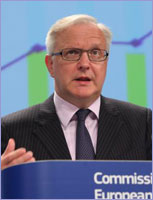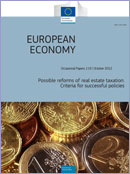|
|
|
|
|
|
 |
 |
 |
 |
Commission autumn forecast 2012-14: sailing through rough waters
According to the Commission’s autumn economic forecast, the short-term outlook for the EU economy remains fragile, but a gradual return to GDP growth is projected for 2013, with further strengthening in 2014. The figures released on 7 November show GDP contracting on an annual basis by 0.3% in the EU and 0.4% in the euro area in 2012. GDP growth for 2013 is projected at 0.4% in the EU and 0.1% in the euro area. Unemployment in the EU is expected to remain very high. The process of reducing the imbalances that built up during the pre-crisis years continues to weigh on domestic demand in some countries. At the same time, some Member States are gradually regaining competitiveness, so export growth is projected to increase as global trade accelerates. Moreover, the structural reforms that countries have undertaken should begin to bear fruit over the forecast period, while enhancements to the architecture of Economic and Monetary Union (EMU) continue to strengthen confidence. The above factors should pave the way for a stronger and more broad-based expansion in 2014. GDP growth in 2014 is projected at 1.6% in the EU and 1.4% in the euro area.
|
 |
 |
 |
|
 |
 |
 |
 |
 |
|
 |
 |
 |
Our projections point to a gradual improvement in Europe's growth outlook from early next year. Major policy decisions have laid the foundations for strengthening confidence. Market stress has been reduced, but there is no room for complacency.
Olli Rehn, European Commission Vice-President for Economic and Monetary Affairs and the Euro |
 |
|
|
|
 |
 |
 |
 |
Positive assessment concludes first review of Spanish financial assistance programme
The first review of Spain’s financial assistance programme has concluded that the programme implementation is on track. A delegation from the European Commission, in liaison with the European Central Bank (ECB) and the European Stability Mechanism (ESM), conducted the first review mission from 15 to 26 October. The International Monetary Fund (IMF) also participated in the meetings as part of its independent monitoring. Mission staff held intensive and productive discussions with the Spanish authorities, and obtained a detailed update about the macro-financial situation in Spain and the current performance of all the major Spanish banks. The mission also reached agreement with the Spanish authorities on important aspects of the design and functioning of the future Asset Management Company (AMC) that will form the cornerstone of the programme. The AMC will be operational as of 1 December.Vice President Olli Rehn said: “This is another step towards the thorough repair and reform of the banking system in Spain, which is in turn an essential building block for a return of investor and consumer confidence.”
|
 |
|
 |
 |
|
 |
 |
 |
 |
G20 Finance ministers discuss progress and challenges, strengthen framework for assessing compliance with commitments
European Commission Vice-President Olli Rehn participated in the G20 Finance Ministerial meeting held in Mexico City on 4 and 5 November. Discussions focused on the global economic situation and the risks to the economic outlook. Vice-President Rehn emphasised the important steps taken in addressing the euro area crisis since the Los Cabos G20 Summit in June. G20 Ministers also discussed issues related to the international financial architecture, financial regulation and financial inclusion, energy and commodities, and the transition to the upcoming Russian G20 Presidency. Progress was made in strengthening the framework assessing compliance with past G20 commitments in the areas of fiscal, monetary and exchange rate policies. During the Russian Presidency, ministers will further consider indicators and approaches to assess spillover effects, progress towards commitments on structural reforms and the collective achievement of strong, sustainable and balanced growth. Work will also continue on the follow-up to the Toronto fiscal commitments, with the aim to reach agreement by the next G20 Summit in St. Petersburg. The next G20 Finance Ministerial meeting, the first under the Russian G20 Presidency, will take place from 14-16 February 2013 in Moscow.
|
 |
|
 |
 |
|
 |
 |
 |
 |
Eurogroup acknowledges progress made on updated programme conditionality for Greece
In a statement issued on 31 October, the Eurogroup of euro area finance ministers acknowledged progress made towards a full staff level agreement between Greece and the European Commission, the European Central Bank (ECB) and the International Monetary Fund (IMF), the “Troika”, on updated programme conditionality. The updated conditionality would include ambitious and wide-ranging measures in the areas of fiscal consolidation, structural reforms, privatisation and financial sector stabilisation. The Eurogroup called on the Greek authorities to resolve any remaining issues in order to swiftly finalise negotiations with the Troika. The Eurogroup expects to further discuss the Greek adjustment programme at its next regular meeting on 12 November.
|
 |
|
 |
 |
|
 |
 |
 |
 |
Vienna 2 proposes enhancements to cross-border supervision to European authorities
On 26 October, the Steering Committee of the Vienna 2 Initiative submitted a list of proposed enhancements to cross-border supervisory practices to the European Banking Authority (EBA), the European Central Bank (ECB), and the European Commission. Vienna 2 is a private-public platform that was re-launched in January 2012. It aims to ensure adequate capital and liquidity support by Western banking groups for their affiliates in Central, Eastern, and Southeastern Europe (CESEE). The current proposals aim is to provide input on the design of the supervisory framework for Europe and to communicate the systemic concerns of host countries. Throughout the crisis, the viewpoints of home and host authorities have sometimes differed when assessing the systemic risk of financial institutions, not least because subsidiaries may account for only a minor part of a banking group yet be systemic in host countries. The Vienna 2 initiative is also preparing detailed comments on the new bank resolution proposal for submission to the relevant European authorities.
|
 |
|
 |
 |
|
 |
 |
 |
 |
EU-EIB Project Bond Initiative pilot phase ready for roll-out
The Europe 2020 Project Bond Initiative, which aims to improve capital market financing of infrastructure, passed its final approval stage on 7 November. Following signature of a Cooperation Agreement between the European Commission and the European Investment Bank (EIB), specifying the terms and conditions of the implementation, the pilot phase of the project bond initiative is ready for roll-out. This follows approval by the Board of the EIB at their last meeting and by the European Commission, as required by the legislation adopted by the European Parliament and EU Council of Ministers earlier this year. The pilot phase will benefit from EUR 230 million from the EU budget and will focus on encouraging capital market contributions worth more than EUR 4 billion for infrastructure investment in the transport, energy and communications sectors.
|
 |
|
 |
 |
|
 |
 |
 |
 |
Economic sentiment declines in euro area but remains stable in EU
In October the Economic Sentiment Indicator (ESI) remained unchanged in the EU, at 86.2, and declined by 0.7 points in the euro area, to 84.5. In the EU, marked declines in the industry and construction sectors were offset by improvements in services and retail trade. Consumer confidence remained broadly unchanged. In the euro area marked decreases in industry and construction outweighed the improvement in the retail trade sector, while confidence in services and among consumers remained broadly stable. Overall, the decrease in the ESI has lost pace since September in both areas. Although the majority of Member States witnessed a drop in economic sentiment, the ESI registered falls in only three of the seven largest Member States: Poland (-2.8), France (-1.8) andGermany (-1.4). Moreover, the ESI continued last month's recovery in the UK (+5.2) and Spain (+1.8) and rose slightly in the Netherlands (+0.8) and Italy (+0.5). DG ECFIN publishes the Business and Consumer Survey Results every month, as well as quarterly survey results for the manufacturing industry and consumers in January, April, July and October.
|
 |
|
 |
 |
|
 |
 |
 |
 |
Household saving rate down in euro area, stable in EU; real income falls in euro area
According to data released on 30 October by Eurostat, the EU’s statistical office, the household saving rate decreased in the euro area while remaining stable in the EU in the second quarter of 2012 compared with the first quarter of 2012. In the euro area, household income per capita fell by 0.5% in real terms, after a decrease of 0.3% in the previous quarter. The household investment rate fell in both the euro area and the EU. The data come from a detailed set of seasonally adjusted quarterly European sector accounts released by Eurostat and the European Central Bank (ECB).
|
 |
|
 |
 |
|
 |
 |
 |
 |
A visa policy to spur economic growth in the EU
In a strategic Communication adopted on 7 November, the Commission examines how the implementation and development of the common visa policy could help growth in the EU by facilitating travel opportunities for third country nationals who wish to visit the EU. Tourism has become one of the biggest generators of employment in the EU and a key driver of economic growth and development. In 2011, the sector accounted for 18.8 million jobs and foreign visitors spent more than EUR 330 billion. Moreover, according to recent estimates, employment is likely to rise to 20.4 million jobs and spending to over EUR 427 billion in 2022. According to one estimate, fully exploiting flexibility in the current visa rules could generate additional income of between EUR 11-60 billion in international tourism receipts (exports) and create between 100,000 and 500,000 additional jobs directly in the tourism sector. Tourism has a considerable impact on the economy as a whole, through spending on accommodation, food and drink, transport, entertainment, shopping and other items.
|
 |
|
 |
 |
|
|
|
|
|
 |
 |
 |
 |
Possible reforms of real estate taxation: Criteria for successful policies. European Economy. Occasional Papers. 119.
This publication advocates a tax on residential property, noting that taxes on immovable property are efficient and among the least detrimental to growth. It explores different approaches to taxing residential properties. The authors acknowledge that while a first-best policy implies taxation of imputed rents and allowing for deduction of mortgage interest payments, it is politically difficult to sustain an appropriate tax level on the return of the property, particularly when house prices are rising. Instead, a second-best policy could be to remove mortgage interest deductibility and introduce a recurrent tax on property. In order for the tax to function properly, however, it is essential to regularly update the tax base according to price developments on the housing market. Policy must also mitigate the negative impact on vulnerable households due to the increased property tax burden. The paper provides an overview of the state of play regarding these issues in the EU.
|
|
 |
 |
|
|
|
|
|
|
|
|
|
|
|
 |
| Directorate-General for Economic and Financial Affairs |
 |
|